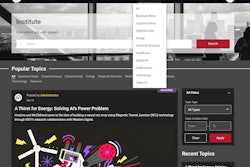
The demand for cybersecurity talent within the supply chain industry is booming, and for good reason. As the industry becomes increasingly interconnected, so does the threat of data breaches, necessitating a larger need for the right minds and expertise to prevent these obstacles.
Despite this pressing requisite for cybersecurity professionals, the supply chain industry still lacks the diverse talent they require to be successful. In fact, less than one-quarter (24%) of the entire cybersecurity workforce are gender diverse, facing barriers such as lack of awareness at an early age, support within the field, imposter syndrome, and more.
If supply chain leaders want to be at the forefront – or better yet, two steps ahead – of mitigating cyberattacks (and remain authorities in the space), they have to embrace hiring with diversity in mind. Diverse teams are 87% better at making decisions and 35% more likely to outperform their competitors. Simply put, supply chain leaders should adjust current methods of identifying, recruiting, and retaining gender diverse talent (i.e. women, the LGBQTIA+ community, and other minority groups), while ensuring top performance in times of volatility and threat remains a priority.
Change Needs to Start Earlier Than You Think
While young women and other minority individuals today are taught they can have a successful career in any industry, having the right support from educators, peers, and co-workers are key factors in the eventual decision to enter – and stay in – technical fields. Around 74% of middle school females are interested in STEM subjects. Yet, when they reach high school, interest drops, further proving the need for unwavering awareness efforts and support at an early age.
According to a recent report from the NSF's NCSES, more women worked in STEM jobs over the past decade compared to previous years, proving progress in the right direction. Despite this increase, a lack of external support and awareness leaves adolescents exploring different paths. Since many decide their majors as early as age 18, promoting technical roles in college can even be considered too late.
Therefore, it’s imperative that leaders encourage young talent by communicating and rewarding the skillsets needed to hold these roles and showcase the career paths available. This can look like anything from having employees talk to schools, providing free seminars and camps, or participating in mentorship programs.
Sincerity is Key to Recruitment
During the hiring process, authenticity can make or break a candidate’s decision to stay. That’s why supply chain and cybersecurity managers must have a diverse hiring panel to showcase their sincere interest in recruiting minority groups.
No matter the level, if talent from a minority group only sees a panel of interviewers who don’t reflect them, it diminishes a business’s effort to encourage diversity. For example, 70% of job seekers evaluate whether a company's workforce is diverse before applying or accepting a job offer. Seeing diversity at the leadership level demonstrates a company not only talks the talk but walks the walk and showcases long-term growth and internal movement exists there. Without tangible evidence backing that claim, individuals will be tempted to look elsewhere.
Support Talent Through Action
There are legitimate ways to improve the hiring process and support incoming cyber employees within the supply chain industry. More than two-thirds of female talent want to be senior leaders, and these candidates have showcased having the opportunity to advance is a top priority for them.
If hiring managers want to show that they are interested in a candidate, they should ask questions like “How do you see yourself growing in this position? And what are your career goals?” Ultimately, this makes it clear to the candidate – this company genuinely wants to see them succeed. Gender diverse organizations are 15% more likely to outperform the median of their respective national industry, further proving the benefits of this investment to any business.
Once managers have found the right person for the job, offering the right compensation and benefits is key to getting them to sign an offer. Presenting competitive compensation for an employees’ skills and experience, is a great way to showcase the recognition of what that person brings to the table. Talent needs to know their future employer sees and appreciates their value-add to best feel supported.
Internal Initiatives Strengthen the Workplace
These new approaches to DEI-focused hiring and growth, do not stop once an interview process is completed. Only 31% of women believe everyone is treated equally and fairly in the workplace, showing a deeper culture change is in order to retain women and other minorities in the industry.
The idea of unequal treatment, however, is far more nuanced than the traditional breakdown for gender diverse and minority employees. While much of this dichotomy is evident, women also experience anxiety around not adequately performing, or imposter syndrome. Across all industries, 75% of female executives have experienced imposter syndrome in their careers and 32% of women identified with imposter syndrome, because they did not know others in a similar professional position and/or level. Within male dominated sectors such as cybersecurity, and more specifically in the supply chain industry, things like support groups and mentors from early on will help diverse individuals feel more included and create a work environment they want to be a part of long-term.
Women who do break into this space, play a crucial role in paving the path for those to come. They are the game-changers who know how to be successful in this industry and have the wisdom to share with those looking to accomplish similar career goals.
Mentorship programs give employees a safe space to ask questions they may have been worried to ask coworkers on their direct team, or even their manager. Even just one internal connection in another business unit, can help build confidence within a male-dominated space. Companies with mentorship programs have a 50% higher retention rate than those not involved in mentoring.
Provide Recruitment Through Employment
As the supply chain industry looks to fill cybersecurity roles, it’s important for hiring managers and employers to provide women, LGBTQIA+ other minority groups with an equitable, supportive experience from recruitment through employment.
Diverse talent plays a critical role in allowing the supply chain to advance against cyberattacks and beyond. If supply chain leaders want to be pioneers in the way they perform against threats, they need a gender-diverse workforce.



















